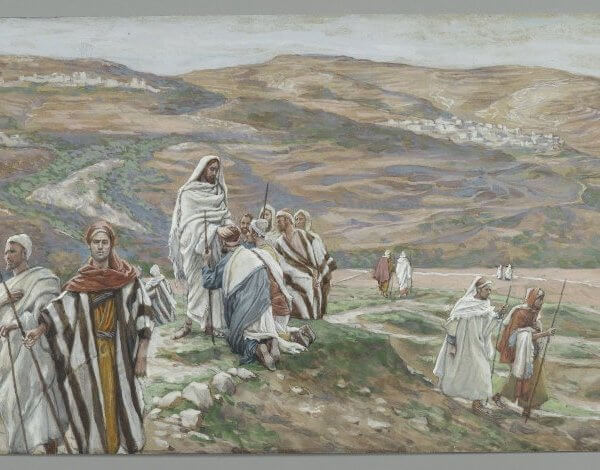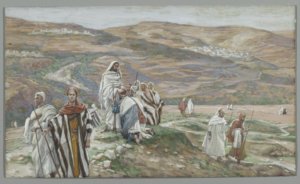
Leave Your Bags of Doubt Behind
In this morning’s gospel, we see two different responses to God: the unsuccessful response in Nazareth, where Jesus’ friends and neighbors do not welcome his liberating message of love, and the eager reception in villages all over the Galilee, where people are meeting Jesus for the first time. Before returning to Nazareth at the start of today’s reading, Jesus has healed and changed people’s lives all around the Sea of Galilee. But to say that Jesus was not well-received in Nazareth is a gross understatement.
 Mark’s gospel makes their response to Jesus really clear: the people in the synagogue in his hometown of Nazareth take offense at Jesus. The gospel doesn’t tell us anything about Jesus’ lesson plan for the day. The people are offended by Jesus himself, not by the content of his sermon or his bible study topics. This is different from the people’s response to Jesus in the villages around Nazareth — Capernaum, Magdala, and Tiberius down on the Sea.
Mark’s gospel makes their response to Jesus really clear: the people in the synagogue in his hometown of Nazareth take offense at Jesus. The gospel doesn’t tell us anything about Jesus’ lesson plan for the day. The people are offended by Jesus himself, not by the content of his sermon or his bible study topics. This is different from the people’s response to Jesus in the villages around Nazareth — Capernaum, Magdala, and Tiberius down on the Sea.
In those villages, the crowds are receptive to Jesus’ miracles and healing. But in Nazareth, the people take offense at Jesus, and he could do no deeds of power. The physical distance between these places — and the time it takes to walk it — create a clear separation between the lively ministry that Jesus has developed in the villages around the Sea and his disappointing interaction in Nazareth, giving us a good look at the differences.
It’s About You
One of my favorite divinity school professors often said, when you’re wondering what a particular passage in scripture is about, you can be pretty sure it’s about you. These two different contexts — leading to very different responses to Jesus — invite us to stop and notice how we respond to God in our own lives.
In Nazareth, Jesus teaches in the synagogue, as he has all over the Galilee. I think it’s interesting that the word synagogue — like church — is often used now to mean the place where people gather for worship. In other words, the building itself. But the original meaning of synagogue — and church, for that matter — is not a building at all but the gathering of the people. We’re focused here on the relationship between the people gathered there — the synagogue — and Jesus. So if this passage is about us, where do we stand in the story?
The people gathered in Jesus’ hometown would have been faithful and observant Jews. These were the folks — like us — who showed up to church instead of sleeping in that, or working overtime tending the sheep. The folks who were gathered in Nazareth were likely the ones who were most committed to keeping God’s law, and doing what they thought God wanted. So as we think about why Jesus’ hometown folks would be offended — not by the content of his teaching and preaching, but by Jesus himself — we can refer to our own lives for insight. Maybe the people of Nazareth were envious of Jesus’ wisdom and deeds of power. Maybe the people in Nazareth thought Jesus was playing fast and loose with the teachings of the rabbis. Or maybe they didn’t think much of themselves, and couldn’t imagine that someone they knew from home could bring the good news that Jesus was bringing. Whatever the reason, the Nazarenes rejected their hometown boy’s teaching, and Jesus could do no deeds of power there.
Theology professor George Hyder writes, The fact is that we have an awful time truly listening to and seeing God at work in those whom we think we know well. Is that because we don’t think much of others? Or is it because we’re so proud of our own accomplishments, church attendance, giving, and efforts that others don’t seem to measure up?
We Can’t Imagine God Working in Us
I don’t think that’s it. I think it’s because we think we know ourselves so well — all our foibles and weaknesses — that we can’t  imagine God working in us. And so it’s difficult for us to see God working in any community that we’re a part of. Groucho Marx was famous for saying I refuse to join any club that would have me as a member, and while that’s a laugh line, I think that especially in this new vulnerability of our pandemic-enlightenment, it’s a useful insight into our habit of underestimating God’s power in us. You can’t follow Jesus’ New Commandment — love God and love your neighbor as yourself — without loving yourself, and being open to seeing God working in you. And when you can see God working in you, transforming the way you see yourself and how you interact with the world, you’ll start to see God working in your neighbor too.
imagine God working in us. And so it’s difficult for us to see God working in any community that we’re a part of. Groucho Marx was famous for saying I refuse to join any club that would have me as a member, and while that’s a laugh line, I think that especially in this new vulnerability of our pandemic-enlightenment, it’s a useful insight into our habit of underestimating God’s power in us. You can’t follow Jesus’ New Commandment — love God and love your neighbor as yourself — without loving yourself, and being open to seeing God working in you. And when you can see God working in you, transforming the way you see yourself and how you interact with the world, you’ll start to see God working in your neighbor too.
We’ve been through a lot of change, pain, and loss in this past fifteen months or so since the pandemic started, as a community, and as human beings in the world. It’s easy to get focused just on our own lives and problems, making us less willing and able to see God at work — in ourselves and others.
How do we respond to God? Do we respond like the people in the villages around the Sea of Galilee, who see clearly that God is walking among them, like the 5,000 people who dined like kings on five loaves and two fishes because they saw the present effect of God’s work? Or do we respond like Jesus’ neighbors and kinfolk, who were so down on themselves that they couldn’t even see the possibility that God might show up in Nazareth?
Take Nothing
 In the second half of today’s gospel, Jesus changes his leadership plan, and there is a much different result. Jesus sends the apostles out two by two, and his instructions are really interesting. He tells them to take nothing with them but the sandals on their feet and the clothes on their backs — no food, no money, no extra clothes, and — this is big — no bag to carry anything in. He also clearly tells them to stay until they leave.
In the second half of today’s gospel, Jesus changes his leadership plan, and there is a much different result. Jesus sends the apostles out two by two, and his instructions are really interesting. He tells them to take nothing with them but the sandals on their feet and the clothes on their backs — no food, no money, no extra clothes, and — this is big — no bag to carry anything in. He also clearly tells them to stay until they leave.
What is this new plan? Is Jesus simply articulating clearly the approach they did use in Nazareth? Mark’s gospel doesn’t say. Whether this was a new approach or not, their results are different now. Jesus and the apostles, after their false start in Nazareth, cured the sick and cast out many demons.
What if the problem in Nazareth was that the people couldn’t imagine God being there? What if no one was healed because they didn’t ever come to God for healing, because they never looked for God there? If the disciples don’t come full of their own ideas, with an answer for everything, holding onto their own foods, their own money, and their own culture — and with somewhere else to be — they leave space for hope. If we all arrive empty-handed, without our bags of history and self-doubt, we’re ready to see and do miracles.
Your vestry will have an annual retreat July 10 — the first since I came to Emmanuel. We will take this time together, with Canon Dena Cleaver-Bartholomew, the Canon to the Ordinary of the Diocese of Rhode Island, to plan our work together with God here at Emmanuel. We ask for your prayers for that we will leave our bags of self-doubt at home to be ready for the miracles that God will work in and through all of us, and respond in hope and love to the miracle of God’s presence. Amen
